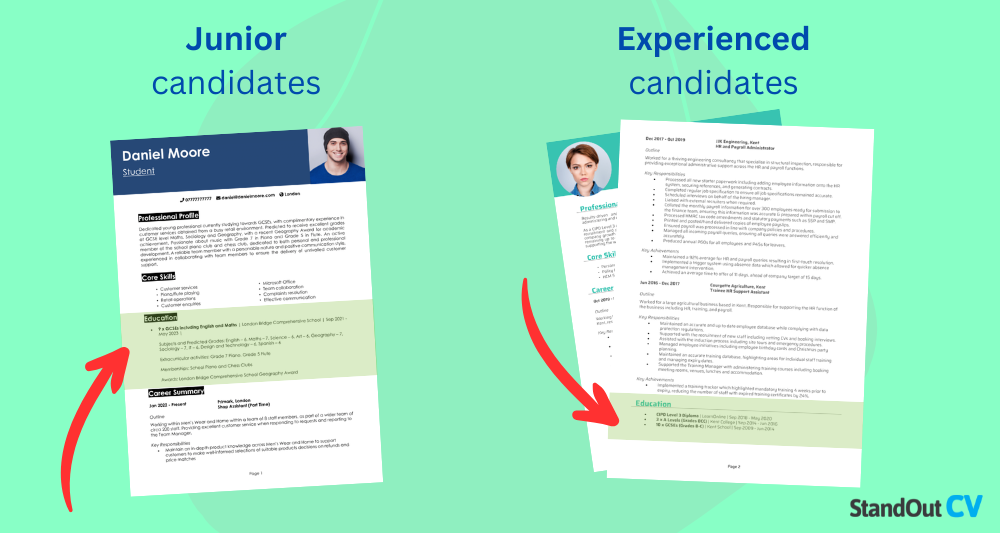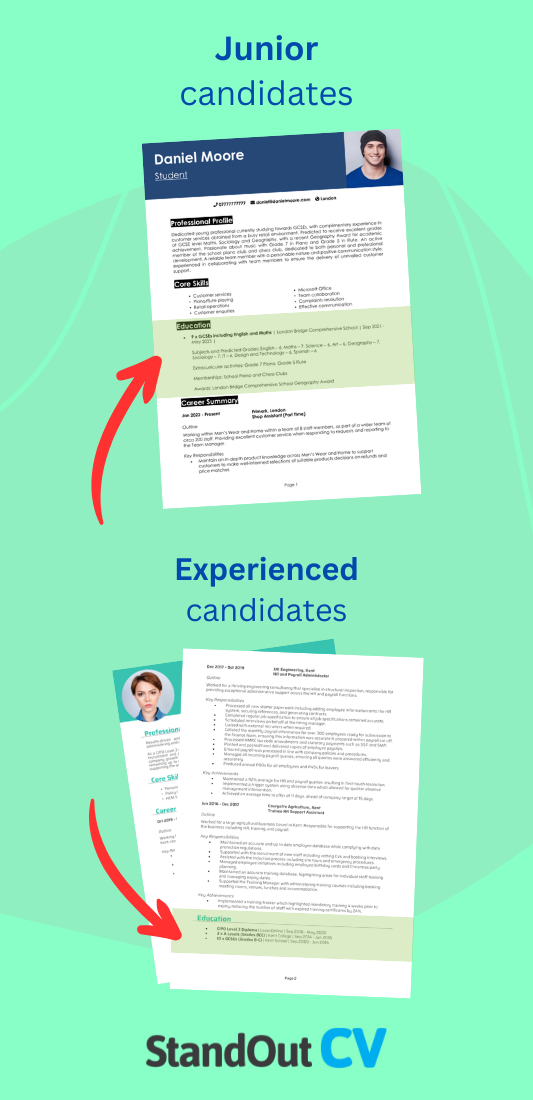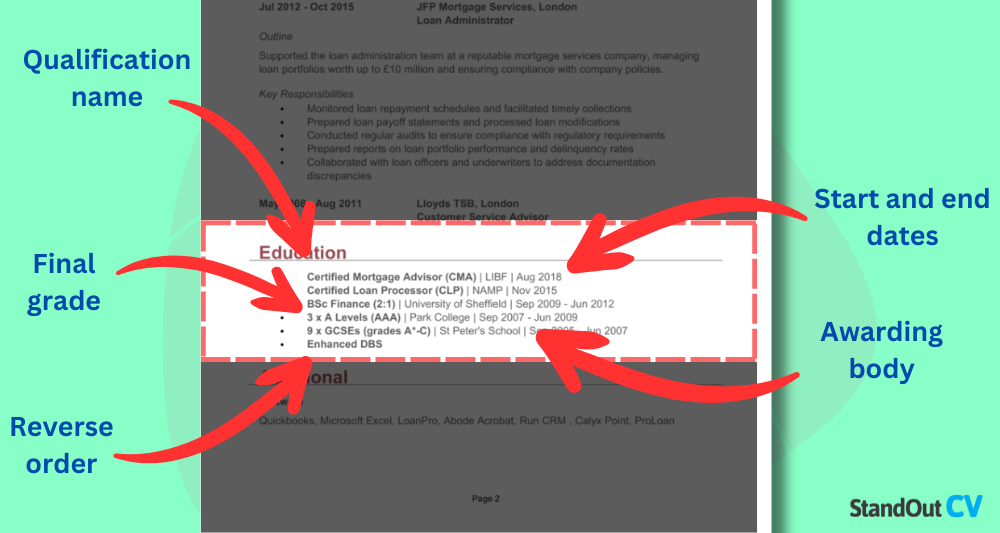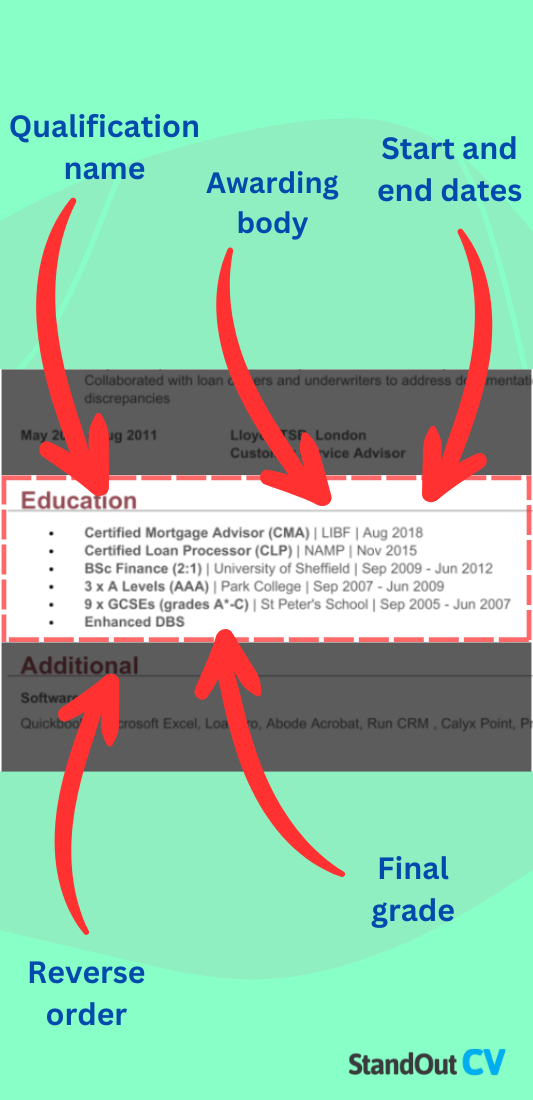Your education section might not feel like the most exciting part of your CV, but it can make a big difference.
For experienced candidates, it’s often just confirmation of your qualifications. But if you’re starting out or changing careers, it can be the section that convinces a recruiter you’re ready for the role.
I used to read this part of the CV in great detail when someone had limited work history, and it told me whether they had the right foundation.
Here’s how to write your education section in a way that highlights your strengths and reassures employers you’ve got what it takes.
Where to put your CV education section


The placement of your education section depends on how much experience you have and how relevant your qualifications are to the job you’re applying for.
Experienced candidates
Recruiters value experience more: so if you’ve been in the workforce for several years, your work history should take priority.
In this case, position your education section below your work experience. Keep it concise, highlighting only the most relevant or recent qualifications.
Junior candidates
When you’ve got little or no experience, your education becomes one of your strongest assets. Place it near the top of your CV – just below your profile and core skills section.
You can expand on this section slightly to write about relevant modules, academic projects, or coursework that aligns with the job.
What to include in your CV education section
The qualifications you include in your CV should be tailored to your level of experience and the role you’re applying for. This isn’t an academic transcript: you don’t need to list everything you’ve ever studied – just the ones that demonstrate your suitability for the job.
Here’s what usually earns a place in the education section:
- Degrees and higher education – Include any undergraduate or postgraduate degrees (e.g. BA, BSc, MA, MSc), especially if they’re directly relevant to the role.
- A-levels (or equivalent) – These are useful for early-career candidates, or if you didn’t go on to higher education. You can list subjects and grades if relevant.
- GCSEs (or equivalent) – For experienced candidates, it’s fine to summarise these (e.g. “9 GCSEs including Maths and English”). School leavers may want to list individual subjects and grades.
- Vocational qualifications – These include BTECs and NVQs, and similar certifications. They’re especially important for practical and technical hands-on roles.
- Professional certifications – If you’ve completed role-specific training or industry-accredited courses (e.g. CIPD, ACCA, PRINCE2, CompTIA), be sure to list them.
- Short courses and online training – Certifications from platforms like Coursera, LinkedIn Learning, or Google Digital Garage can demonstrate up-to-date skills, especially for career changers or digital roles.
- Apprenticeships and placements – Formal apprenticeships or structured placements should also be included, as they combine education with practical experience.
Only include outdated or unrelated qualifications if space allows and they add genuine value. The aim here is to reassure the employer that you’ve got the right knowledge or training for the job, not dragging the reader through your Year 9 woodwork certificate.


How to write your education on your CV


Regardless of your level of experience, each entry in your education section should include the following details:
- Name of the qualification – Give the name of the award, for example BA (Hons) Marketing, GCSE, Level 3 Diploma in IT, and so on.
- Institution – State where you studied, such as your university, college, or school.
- Dates attended – Simply give the month and year (or just year) of start and end dates.
- Grades or results – Include your final grade or classification (or your expected result) if it’s strong or relevant.
Newer candidates should consider appending some detail on any relevant subjects or modules if they apply directly to the target job. Keep the below tips in mind to ensure your education section is the best it can be.
Adapt for your level of experience
If you’re early in your career, it’s okay to provide more detail on relevant coursework or projects. Basically, if you don’t have much to say about work, say more about study: this helps show your strengths in the absence of professional experience.
For more experienced candidates, a brief summary of key qualifications is usually enough.
Prioritise recent and relevant qualifications
List your qualifications in reverse chronological order, with the most recent first. That way, the most up-to-date and relevant training is what recruiters see first.
If you’ve got older or unrelated qualifications, there’s no need to include every detail. For example, if you’ve earned a degree, there’s usually no need to list every individual GCSE – just summarise them (e.g. “9 GCSEs including Maths and English”).
Use bullet points
Recruiters are busy, and would prefer not to navigate through walls of text. Keep your education section clear and easy to scan by using bullet points.
Each qualification should be presented on its own line, and formatting should remain consistent throughout – same order of information, same date format, and a clean layout that’s easy to follow.
CV education section examples
School leaver CV education section
x9 GCSEs (including English and Mathematics) | London Bridge Comprehensive School | 2024-Present | Predicted Grades: English (6) , Mathematics (7) , Science (6) , Art (6), Geography (7), Sociology (7), IT (6), Design & Technology (6), Spanish (6).
Extracurricular Activities: Grade 7 Piano, Grade 5 Flute.
Memberships: The School Piano Club / Chess Club.
Awards: London Bridge Comprehensive School Geography Award.
✅ Why it works
As a school leaver, your GCSEs are likely your highest-level qualification – this education section lists each of them clearly along with their (predicted) grades. Since they lack qualifications and work experience, this candidate expanded on various other extracurricular activities to provide more detail on their suitability.
College leaver CV education section
x3 A-levels | London Central College | 2023-2025
- Graphic Design (B) | Completed a complete product design of a toy package
- Photography (A) | Including wildlife photography project and paper
- English Language (A) | Studying “Of Mice and Men”
x10 GCSEs grade A to C | Baxton High School | Including English, Maths, IT and Art
✅ Why it works
This candidate has just finished their A-levels, so they are the main focus, with a little bit of detail on their specific areas of study. Meanwhile, their GCSEs can be briefly summarised, as they are less significant now.
Recent graduate CV education section
BSc (Hons) Computer Science | Queen Mary University | 2018-2021 | Final grade: 1st Class
- Modules including: Big data processing, data mining, Artificial Intelligence (AI) and algorithms and data structures
- Achieved a 1st (87%) for my dissertation on ‘issues with privacy and security when dealing with big data’, coming top of my class
- Gained practical experience in software engineering, procedural programming and data mining
x3 A-levels | London Central College | 2018-2020 | including Information Technology (A), Business Studies (A) and Graphic Design (B)
x10 GCSEs | Baxton Hill High School | 2013-2018
✅ Why it works
The main selling point for any recent graduate is the degree they’ve just earned: this candidate notes it clearly, along with some key studies and skills they’ve developed. They still include earlier qualifications, but with much less detail.
Experienced graduate CV education section
BA (Hons) Digital Marketing | Queen Mary University | 2018-2021 | Final grade: 2:1
Modules including: Interactive media technologies, media streaming and the Cloud, programming for data analysis and personalising the digital experience
x3 A-levels (AAC) | London Central College | 2016-2018
x10 GCSEs | Baxton Hill High School | 2013-2016
✅ Why it works
This is a candidate with some years of real-world work experience. Their degree and earlier qualifications and academic achievements are still important, but they are shortened somewhat to allow more room for their practical experience in the other sections of their CV.
Experienced professional CV education section
PRINCE2 Practitioner | TrainOnline | 2025
BSc (Hons) Business Process Management | London University | 2022
x3 A Levels (BBC) | Bristol College | 2017-2019
x10 GCSEs (grades A-C) | Bristol School | 2015-2017
✅ Why it works
This experienced candidate places their newest and most relevant vocational qualification at the top: this certificate is central to the roles they’re applying for. Earlier qualifications are simply and briefly summarised, to ensure that they can outline their years of work experience while maintaining a CV length of 2 pages.


FAQs
Where should the education section go on a CV?
Near the top if you’re a recent graduate or school leaver, or below your work experience if you’re more experienced.
How do I format education on my CV?
List each qualification with the name, institution, dates attended, and grade – use bullet points and keep the layout consistent.
Do I need to include GCSEs on my CV?
Yes, especially early in your career. Experienced candidates can summarise them (e.g. “9 GCSEs including Maths and English”).
How far back should I go with my education history?
Stick to your most recent and relevant qualifications – older or unrelated ones can be shortened or left out.
Can I list a qualification I haven’t finished yet?
Yes – just state that it’s in progress and include your expected completion date, and your predicted grade if you’ve been given one.
What if I don’t have formal education?
Focus on relevant training, certifications, or experience that shows your skills – practical knowledge still counts.



